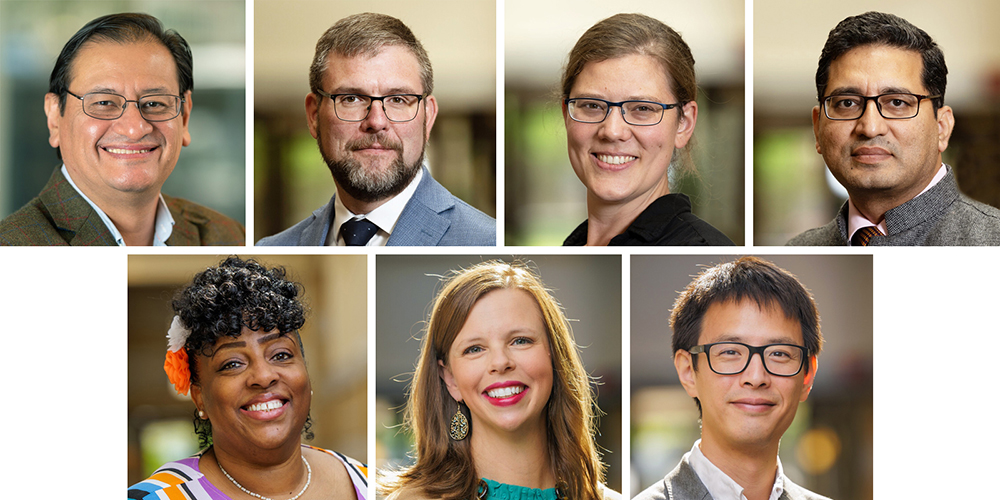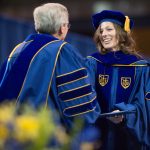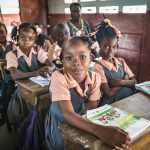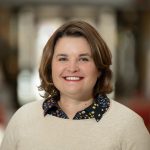The Keough School of Global Affairs at the University of Notre Dame is deepening its expertise in sustainable energy policy, international development and policy, global health, racial justice, global religion, and Irish history with the appointment of several new faculty—some who are new to the Keough School and others who are taking on expanded roles from within its ranks.
“These new faculty ‘fill in the gaps’ of the Keough School’s emerging research, teaching, and global policy profile,” said Scott Appleby, the Marilyn Keough Dean. “In doing so, they bring innovative methods of inquiry and fresh perspectives and insights on issues and challenges that we must understand clearly and comprehensively if we are to fulfill our mission to advance integral human development. I am grateful to my colleagues in the Keough School and the broader university who made the recruiting and hiring of this talented group possible. It was a collective and collegial effort which bore great fruit for Notre Dame.”
Emily Grubert, associate professor of sustainable energy policy, joins the Keough School after serving as deputy assistant secretary for carbon management at the US Department of Energy. Grubert is a civil engineer and environmental sociologist who studies decision-making around large infrastructure systems, particularly justice-focused decarbonization of the US energy system. Specifically, Grubert studies life cycle socio-environmental impacts associated with future policy and infrastructure and how community and societal priorities can be better incorporated into policy and project decisions. Her research methods include scenario analysis, life cycle assessment, survey and interview research, and text mining.
Prior to joining the Notre Dame faculty, Grubert was an assistant professor of civil and environmental engineering and concurrent assistant professor of public policy at the Georgia Institute of Technology. Grubert holds a PhD in environment and resources from Stanford.
Santosh Kumar is associate professor of development and global health economics and an affiliate of Notre Dame’s Eck Institute for Global Health. An applied microeconomist, Kumar focuses on global health and development in low- and middle-income countries. Specifically, his research examines the causal association between child and maternal health, human capital, and poverty.
Kumar’s work uses experimental and quasi-experimental research methods and has extensive experience collecting survey data in India, Bhutan, and Albania. He was a postdoctoral research fellow at the Harvard Center for Population and Development Studies in the T.H. Chan School of Public Health and also has worked at the Institute for Health Metrics and Evaluation at the University of Washington. Prior to joining the Keough School, Kumar was associate professor of economics at Sam Houston State University. He holds a PhD in economics from the University of Houston.
Andrés Mejía Acosta will join the Keough School in January 2023 as associate professor of the political economy of development and as associate dean for policy and practice. He is currently a reader in the political economy of emerging markets at King’s College London, and previously worked as senior governance fellow at the Institute of Development Studies in the United Kingdom. A political scientist who earned his PhD from Notre Dame in 2004, Mejía Acosta explores the political economy of producing effective, accountable, and inclusive policymaking in low- and middle-income countries. Specifically, he focuses on the political and fiscal management of natural resource revenues, with particular attention to Andean countries. Most recently, he developed a political economy framework to analyze nutrition governance, exploring the motivations of governments to invest, coordinate, and implement strategies to reduce children’s undernutrition in low and middle-income countries including Bangladesh, Brazil, Ethiopia, India, Kenya, Niger, Pakistan, Peru, and Zambia.
Gwendolyn Purifoye is assistant professor of racial justice and conflict transformation in the Keough School’s Kroc Institute for International Peace Studies. She also is a faculty fellow of the Keough School’s Klau Institute for Civil and Human Rights. Purifoye’s research investigates how material infrastructures, transportation systems, and spatiality shape the experiences of racially and class-marginalized individuals and communities. An urban ethnographer, Purifoye has conducted extensive fieldwork in Chicago, Washington, DC, and Newark, where she examines the lived experiences of Black and Brown people in public places and neighborhoods. In fall 2021, she held a visiting faculty fellowship at Brown University’s Center for the Study of Race and Ethnicity in America. While at Brown, she researched how Blacks experience the current redevelopment boom in Newark after enduring decades of widespread systemic racism and disinvestment.
Purifoye’s first book, Race in Motion: Public Transportation and Restricted Mobile Spaces (under contract with NYU Press) uses ethnographic and archival data to examine how public transportation is used to support persistent inequalities and inequities that are raced, spatial, material, social, and embodied. She holds a PhD in sociology from Loyola University Chicago.
Colin Barr, professor of modern Irish history, has been named the director of the Clingen Family Center for the Study of Modern Ireland, part of the Keough School’s Keough-Naughton Institute for Irish Studies. Barr begins these new roles after serving as a reader in modern Irish history at the Keough-Naughton Institute since 2020.
Through his scholarship, Barr seeks to place the history of Ireland and its people in a broad context, including that of the United Kingdom, the continent of Europe, the Roman Catholic Church, and the global Irish Diaspora. He is the author or editor of several books, including Ireland’s Empire: The Roman Catholic Church in the English-speaking World, 1829-1914. Barr has held academic appointments in Ireland, the United States, and the United Kingdom, and has been a visiting fellow at Sidney Sussex College at Cambridge and the University of Newcastle, Australia. He is a fellow of the Royal Historical Society and holds a PhD from the University of Cambridge.
Dory Mitros Durham has been appointed associate teaching professor in the Keough School’s Klau Institute for Civil and Human Rights. Durham, whose expertise includes civil rights, institutional racism, and United States immigration law and policy, has served as associate director of the Klau Institute since 2019. Durham teaches the course Building an Anti-Racist Vocabulary and serves as moderator for the online lecture series by the same name. She also acts as the school’s diversity and inclusion officer.
Prior to joining the Keough School, Durham served the federal judiciary as a career law clerk to Hon. Kenneth Ripple. She previously held a Skadden Fellowship at Indiana Legal Services, providing holistic legal services to immigrant victims of violence throughout the state and training local law enforcement agencies on issues concerning immigrant communities. Durham is a summa cum laude graduate of the Notre Dame Law School.
Alex Hsu, assistant teaching professor of global affairs, studies global religion, Buddhism, Chinese religion, and early Chinese Buddhist scriptures. Hsu teaches the undergraduate courses Introduction to Buddhism, Engaging Religions: An Introduction to Religion and Global Affairs, and Asian Spiritualities and Global Affairs. Hsu also is director of undergraduate studies at the Keough School’s Liu Institute for Asia and Asian Studies and academic advisor at the Ansari Institute for Global Engagement with Religion. He also manages Faith in the Story: Trialogues for Enhancing Religious Literacy with Mahan Mirza at the Ansari Institute.
Hsu’s current research focuses on early Buddhist scriptures in medieval China and employs perspectives from manuscript studies, genre theory, and cultural history. He holds a PhD in the history of religions from the University of Chicago Divinity School.
The Keough School of Global Affairs advances integral human development through research, policy and practice; transformative educational programs; and partnerships for global engagement. Founded in 2014, the Keough School builds on the strengths of nine institutes focused on international research, scholarship, and education at Notre Dame. The School offers academic opportunities at both the graduate and undergraduate level, including a joint doctoral degree in peace research, a master of global affairs degree and a major in global affairs.



